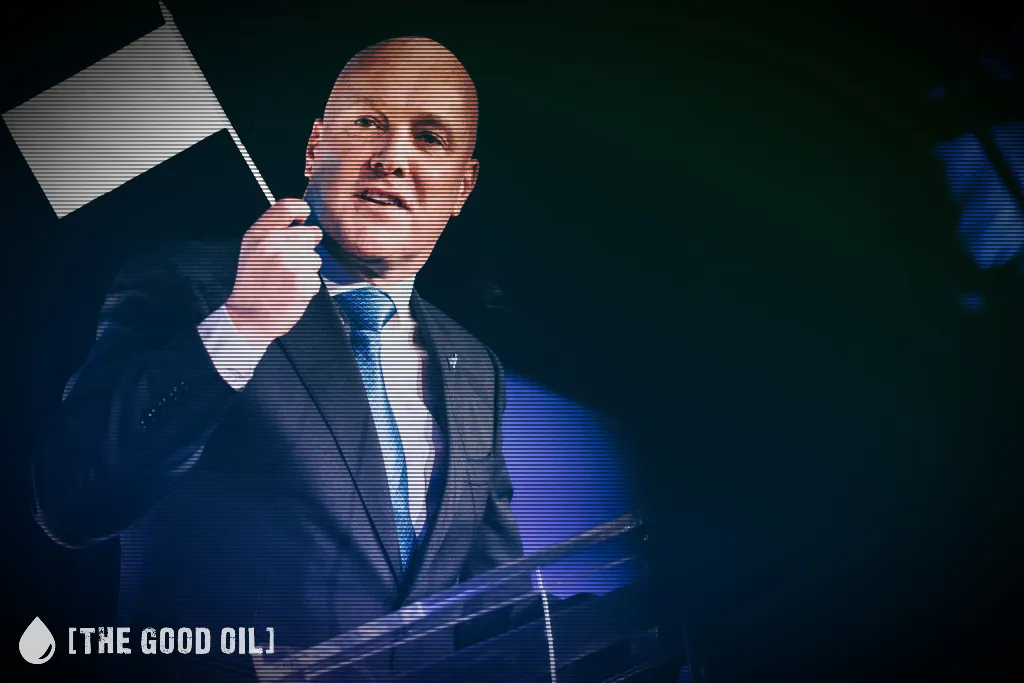Table of Contents
Never meet your heroes, as the saying goes. Perhaps ‘never’ is too strong a word but I can personally affirm that, on at least two occasions, actually meeting people I admired was a very bad idea.
The first was a prominent punk rock singer and would-be writer. For years, I’d admired his music and almost liked some of his writing. In the late ’80s, he toured Australia for the first time and, as a music journalist, I got to meet and interview him. What a disappointment. He turned out to be a rude, arrogant prick. Over the years many people have related the same experience. The only people he seems to have been nice to are the ones he clearly wanted something from.
I still like some of his music, but always in the back of my mind is what a complete turd of a person he really is.
The second was a politician. This one I’ll name: Gough Whitlam.
Growing up in a rusted-on Labor household in the 1970s, Whitlam was practically a demigod. I was home sick from school on the day of the dismissal. I still remember rushing out of the house to where my mother was hanging out some washing: ‘Mum! Mum! They sacked Gough!’ In our household, Whitlam became an almost Christ-like martyr, with Sir John Kerr and Malcolm Fraser playing the roles, respectively, of Pilate and the Sanhedrin.
Then I got the chance to meet the Great Man at one of my elder brothers’ graduation ceremonies. I was in my early teens by then. When the ceremony broke up for the Starwine and cheese on crackers, I screwed up my courage and scuttled up to the Mighty Gough. Physically, he was indeed an imposing presence: tall and imperious. Voice squeaking, I tremulously held out my copy of the programme and asked if I might have his autograph.
From his Olympian height, Whitlam glared down at me as I was something he’d stepped in. After leaving me to quake for a moment, he wordlessly snatched the proferred programme and absently scrawled his signature. No asking me what my name was, or leaving any pithy epigram. Just scrawl and silently toss it back to me.
I later learned that my brother’s girlfriend, a nubile 21-year-old blonde, was graced with smiling chit-chat.
That was the beginning of my apostasy from the Cult of Gough.
Now, of course, I’m a thoroughgoing heretic but even I found revelations of Whitlam’s hatred of Israel and antipathy to Jews, coupled with a secretive toadying to Arab dictators, deeply disturbing. It’s one thing to be an arrogant shithead to a fan-struck teenager, quite another to court some of the world’s worst dictators with the aim of taking down the Jews.
Although, perhaps in hindsight, it shouldn’t be all that shocking. This was, after all, the far-leftist who appointed a literal Marxist as Australian Treasurer, and went grovelling to Maoist China in the midst of the Cultural Revolution.
Whitlam’s antipathy to Israel was strictly in line with the shifting currents of leftist dogma, as dictated by the Soviet Union. Although Stalin had initially been instrumental in the UN resolutions that created the modern state of Israel in 1948, the relationship soon soured. Moscow’s crude power calculus quickly turned in favour of Arab states, as ‘decolonisation’ became a useful vehicle for buying Arab loyalty against the Western powers.
Moscow’s Arab puppets hated Israel and tried (in vain) to destroy it as soon as it was (re)born. Israel not only had the bad grace to win, but turned to the Great Satan, the USA, for help. Moscow’s policy turned on a dime, and communists the world over dutifully followed suit. Whitlam included.
When he scraped into government in 1972, Whitlam immediately overturned decades of bipartisan Australian support for Israel. He assured a senior Soviet foreign ministry official, Mikhail Suslov, that Australia was ready to do Moscow’s bidding. In particular, Whitlam promised that he would seek to import more Arabs into Australia, in order to diminish “Jewish pressures”. He described Jewish lobbying as “crude blackmail”.
In a grim foreshadowing of Anthony Albanese’s missing-in-action dithering after October 7, when the Yom Kippur War broke out Whitlam refused to condemn the Arab aggressors. Instead, he argued that Israel’s “arrogance and intransigence” had brought on itself the renewed Arab attempt to wipe it out of existence. He likewise forcefully criticised the US for supplying material for Israel to defend itself, while refusing to say a word about the Soviet Union arming the genocidal Arab states.
At this time, Australia was a non-permanent member of the UN Security Council. The Whitlam Government used this as an opportunity to repeatedly attack Israel and excuse Arab atrocities. When Israel retaliated against PLO terror attacks by striking their bases in Lebanon, Whitlam saw that Australia voted to support a resolution condemning Israel. When a Jewish Labor MP raised the fact of Syrian war crimes, Whitlam refused to use Australia’s seat on the Security Council to raise the matter in the UN.
Well might Whitlam side with the Arabs intent on scouring Jews from the face of the Earth: he was desperate for their money.
Whitlam’s massive spending was fast emptying the government’s coffers. In a notorious scandal, Whitlam turned to a dodgy Pakistani loan shark in a ludicrous scam to secure billions of Arab petro-dollars. Not only did Whitlam violate the Australian Constitution with this secretive scam but, had he succeeded, Australian taxpayers would still be paying off the Arabs, half a century later.
But the Khemlani scandal is well-known. Much less well-known is an even more disgraceful episode that came after Whitlam was mercifully removed from power.
While the Labor faithful railed and screamed, the Australian people quietly backed Kerr’s decision and the Fraser caretaker government. When, true to his word, Fraser arranged new elections weeks after the dismissal, the looming result was obvious: voters were set to overwhelmingly reject Whitlam and Labor.
So, three days before the election, they secretly met with representatives of an Arab socialist dictatorship, begging for money. In highly secret talks, Whitlam begged two representatives of Saddam Hussein’s Baath Party dictatorship for $1 million dollars to fight “Jewish pressures” against “democratic forces”. In return, Whitlam apparently accepted Iraqi demands to effectively spy on Israel, by forwarding any “special information” on the Middle East that Australia might receive from the USA.
Saddam’s regime had another demand: that Whitlam would not allow Bob Hawke to become leader of the Labor Party.
Why would a Middle Eastern socialist dictatorship take such an interest in the career of an Australian union leader? Because, in a clear moral contrast to Whitlam – and the rest of the left, then and today – Hawke was an ardent supporter of Israel and an admirer of Jews.
Hawke was known to tell friends: “If I were to have my life again, I would want to be born a Jew.” Discussing Middle Eastern affairs, he publicly stated, in apparently conscious emulation of JFK, “I’m an Israeli!”
First visiting Israel in 1971, he fell in love with the plucky little country and its people. He felt that Israel echoed the best qualities of Australia: “cocky insouciance” and egalitarian irreverence. Like the Australia Hawke had grown up in and loved, Israel was relaxed and informal in peacetime, but ever-ready to leap into action with grim determination when war was foisted on it. In contrast to Whitlam’s hostility, Hawke was one of the first senior foreign political figures to visit Israel in the aftermath of the Yom Kippur War.
In words that should shame the Albanese Labor Government, Hawke mercilessly rebuked Whitlam’s equivocating talk of “even-handedness”. Such language was morally repugnant. Most especially it ignored that the “two sides” of the conflict could not be starker: Israel sought merely to be allowed to exist. The Arabs did not seek any balance at all: their openly stated goal was the complete destruction of Israel and Jews.
Then, as now, the Australian left were apoplectic. Hawke and his family were subjected to death threats that warranted police protection. The “Friends of Palestine” left-wing activist group placed advertisements in newspapers, accusing Hawke of “prostituting morality in the service of a fascist regime”. Delivering an address to a Jewish group on Australia Day 1974 necessitated massive security.
The cost to Hawke for his pro-Jewish stance was often deeply personal. In 1979 Hawke personally pursued the issue of Jewish refuseniks in the Soviet Union who were banned by Moscow from leaving the USSR and migrating to Israel. When the Soviets lied to him that the refuseniks would be allowed to leave, then openly reneged, Hawke said it was the only time in his life he contemplated suicide.
For the rest of his life, Hawke had to struggle against the Australian left’s relentless hostility to Israel. Even as prime minister. His deputy, Paul Keating, lobbied him to reverse his support, using the same crude electoral calculus that’s dictated the Albanese Government’s equivocation, post-October 7. “I’ve got a whole lot of Muslims in my electorate,” Keating reminded him, “and it doesn’t help me.”
“That’s the way it is,” Hawke replied.
Fifty years on, current foreign minister Penny Wong delivered the Hawke Lecture at the University of South Australia. Wong, a trenchant critic of Israel, (ab)used the occasion to deliver an odious speech that would have had Hawke rolling in his grave.
Repeating her baseless accusations of so-called ‘war crimes’, Wong used the lecture to demand that Israel ‘abide by international law’, and to boast that Australia backs the deeply anti-Semitic International Criminal Court’s grotesque arrest warrants for Israeli leaders. Wong also compared Israel to Russia and China, as well as parroting Hamas propaganda on ‘civilian casualties’.
A more stark contrast between the entrenched hatred for Israel and Jews of the Western left, and the man who declared that “If the bell tolls for Israel, it won’t just toll for Israel: it will toll for all mankind,” there could not be.









